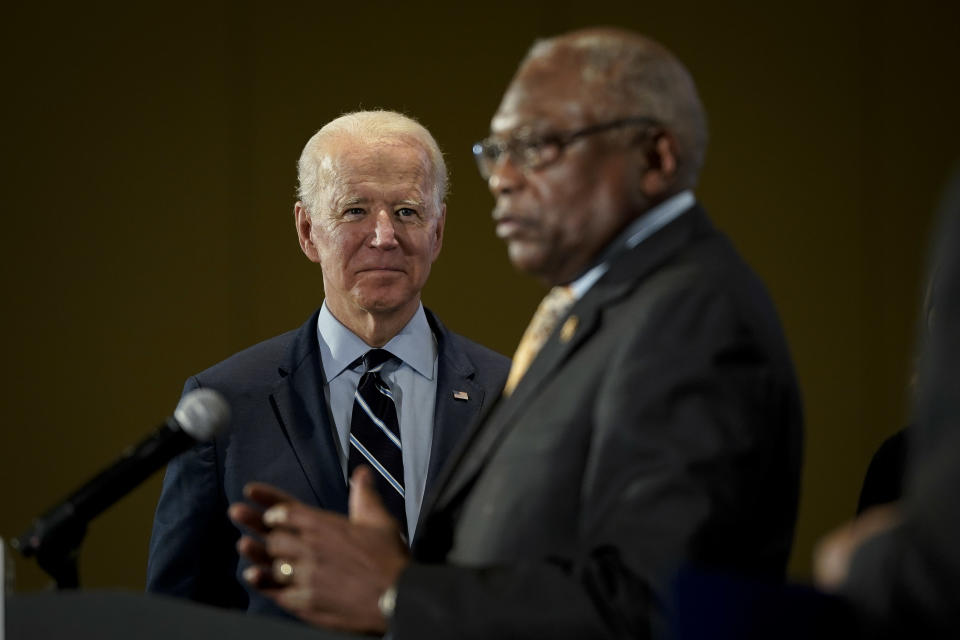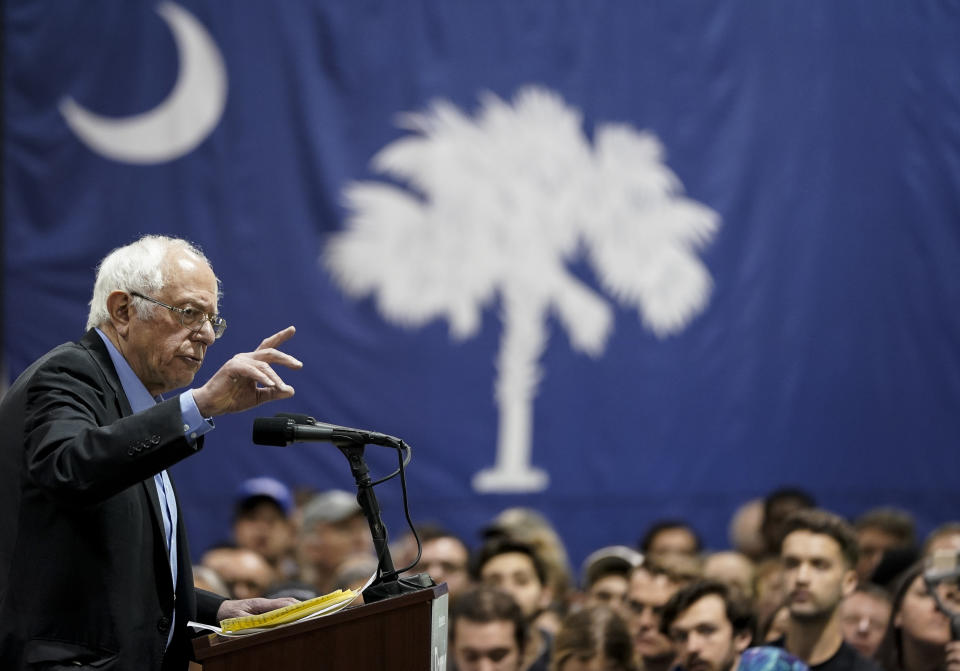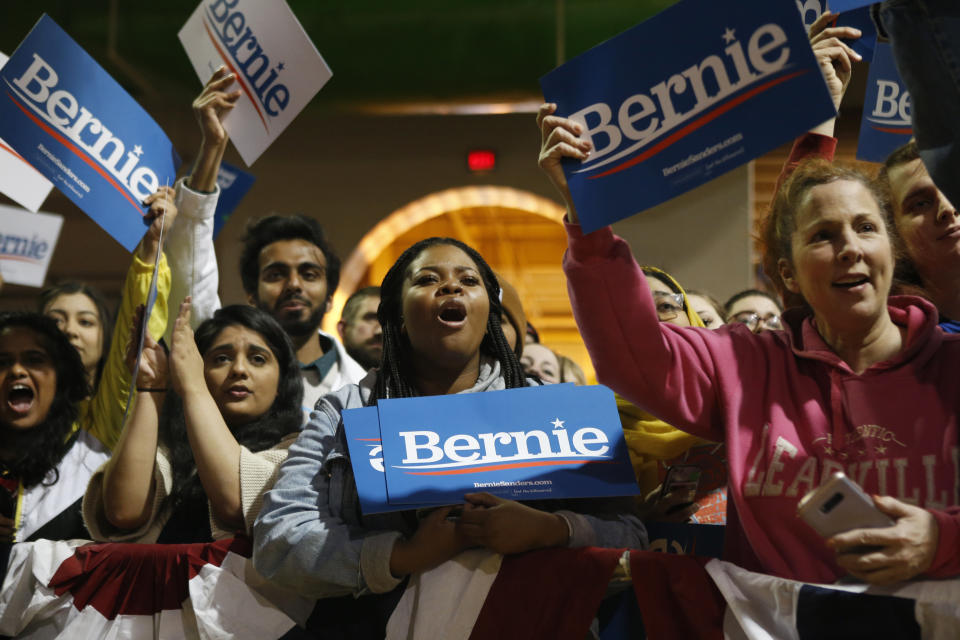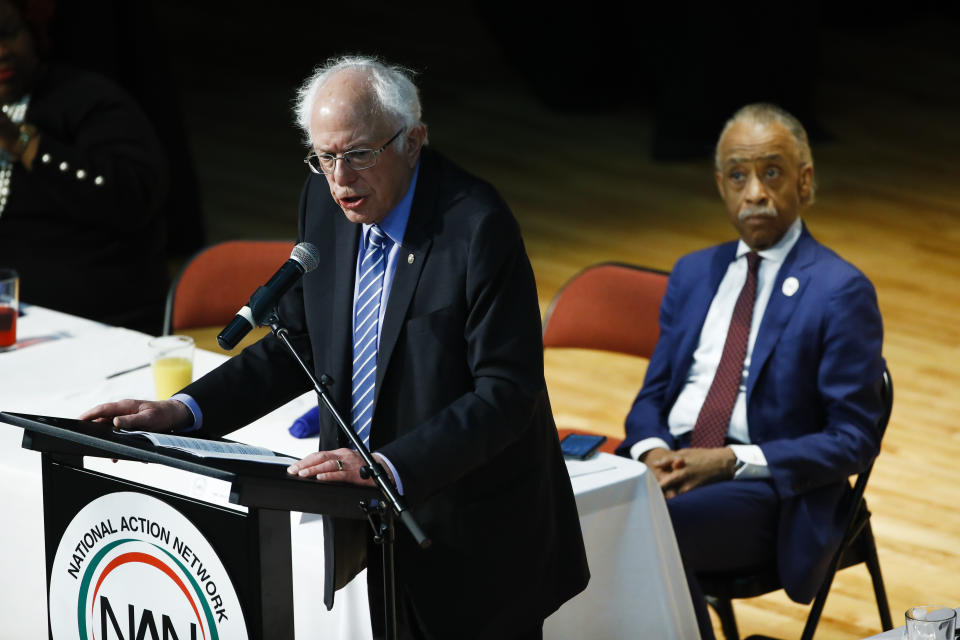Young black voters are a lifeline for Bernie Sanders in the primary. Can they sway the older generation if he’s the nominee?
NORTH CHARLESTON, S.C. — Zay Wells and Esante-Joy McIntyre might be in trouble with their parents.
The pair of high school seniors skipped class on a Wednesday afternoon to attend a political rally here, and for Bernie Sanders of all people. These Gen Z students are obviously feeling the Bern, but their family members are more traditional Democrats who are supporting Joe Biden in Saturday’s South Carolina primary.
Wells, a 17-year-old black teen, conceded that while he and his peers are open to usher in what they believe to be a much-needed coat of political fresh paint to South Carolina, they can’t vote in Saturday’s contest, while many of the adults they know are “scared of change.”
“I believe Bernie is the candidate to bring in something different, but change is a new thing for Charleston,” conceded Wells, who has been attempting to broach supporting Bernie to his more centrist parents.
McIntyre, also a 17-year-old black teen, said those in her Charleston neighborhood are skeptical of progressive policies, like eliminating student debt, even though she thinks measures like that would benefit their community. But Sanders labels himself as a democratic socialist, and the socialist label in particular scares off a lot of people, she says.
Joe Biden, by contrast, has a long-standing relationship with the state’s older voters.
“Older folks know [Biden], trust him,” said McIntyre. “It might be a little too late.”

Both teenagers plan to make a few last ditch pitches to their families before Saturday’s crucial primary — but they’re mostly focused on converting all of their voting-age friends and classmates to the cause.
South Carolina, where black voters make up about 60 percent of the Democratic primary electorate, will be the first test of whether young Southern blacks will be a lifeline for Sanders. And if Sanders is the nominee, he will rely on this group to win over their older relatives and friends, who appear to be largely skeptical of him at this point.
Sanders has earned the frontrunner status in the primary through the first three contests by virtue of his own loyal following, and helped by the disarray of the rest of the field.
But none of those first three contests in Iowa, New Hampshire and Nevada featured an electorate with a significant number of black voters, who form one of the Democrats’ most important and loyal voting blocs.
Biden leads in the South Carolina polling by virtue of his heavy support among older African-American voters.
A mid-February poll conducted in South Carolina found Biden leading Sanders among likely black voters by 35.7 percent to 19.6 percent. Biden’s lead among likely black voters 55 and over was 49.4 percent to 6.7 percent in the survey released by East Carolina University.
Nationally, a Washington Post/Ipsos poll in January showed Sanders winning only 20 percent of the black vote nationally compared to Biden’s 48 percent, with almost all of Sanders’s support among black voters coming from those in the 18-to-34 age range, which, historically, votes at much lower rates than older voters.
On Wednesday, Rep. Jim Clyburn — the most powerful and well-known black politician in South Carolina — endorsed Biden, a significant boost for the former vice president.
Sanders’s appeal to younger voters has a lot to do with his populist message and his cultural cachet, said Addisu Demissie, a Democratic campaign operative who ran the presidential campaign of Sen. Cory Booker, D-N.J.
“If you’re under 35, the world you know is basically the post-Great Recession world, and that is a place where economic populism I think flourishes,” Demissie said in a phone interview. “And when America gets sick, black America gets the flu, so if you’re a young black person, a young black man, you feel [economic hardship] hard and Sanders message appeals to overcoming that.”
Sanders is also a “cultural phenomenon in a way that I don’t think folks who are 45-plus understand.”

Jason Glover, a 28-year-old black barber from Charleston, has been evangelizing for Sanders over the past several months to his nearly all black male clients. Those chats — which sometimes morphed into debates— gave Glover the practice he needed before he pitched his mother.
“I just talked to my mom this morning,” said Glover, who was also attending the Sanders rally. “She was a Biden supporter, but as we've been watching the debates, she hasn't been feeling like he's been the best fit.”
Glover says he was able to convince his mother that Sanders was the better choice.
“I think telling our parents that this candidate is going to help us progress,” added Glover. “I think that makes an impact on our parents.”
Glover’s friend, 28-year-old Brandon Greene, pitched his Biden-supporting family on Bernie too.
“Me and my mom just had a conversation the other day, where I let her know Bernie will be the candidate that I think she should support as well,” said Greene. “A lot of people in my family were with Biden at first. There's been a lot of debate going back and forth — but I think I finally got her.”
That kind of persuasion is crucial to Sanders’s ability to sew up the nomination, and to his chances against Trump if he is the nominee.
And the Sanders campaign also has a highly organized effort to get those younger voters, who are traditionally less likely to vote, to the polls.
The Sanders campaign has devoted six national staffers to campus organizing; those staffers oversee 700 campus corps leaders, student volunteers who graduated from the campaign’s summer and winter school immersive training. One hundred of those campus corps leaders are assigned to various historically black colleges and universities.

In South Carolina, the Sanders’s campaign re-assigned a team of 10 campus and field organizers from other states to target community colleges, where working-class students are sometimes overlooked by get-out-the-vote efforts.
The campaign is tracking students’ canvassing success via their in-house Bern app, which was created by to serve as a hub for its staff and to assist with caucusing and voter registration.
The students goals, to be sure, are ambitious.
“For any hour someone in canvassing, they typically have 10 conversations, and expect at least five to commit,” explained Shana Gallagher, Sanders’s national student organizing director.
If their numbers lag behind expected goals, staffers and campaign “mentors” check in and work to boost results.
In Virginia, one of 14 states that will hold a primary next Tuesday, University of Virginia student Sekum Appiah-Ofori is part of the campus’s Bernie support group that has been working tirelessly to bring their political revolution to Charlottesville — and also to her home.
“My parents are more on the moderate side,” Appiah-Ofori said. “So they supported Hillary in 2016. I did my best to try to move them towards Bernie, but it didn't work. They voted for Hillary and then ultimately Hillary lost and Trump got elected and I was devastated.”

Appiah-Ofori’s parents are both educators who have modest salaries, and last year her father became an Uber driver so he could afford to send Appiah-Ofori to school. This time around, her parents are voting for Sanders. She uses her personal story to pitch other students on Sanders and she feels like it’s working. In August, the “UVA for Sanders” group boasted around 15 members. Now, it’s over 200.
Sanders’s coalition in the primary may be enough to win the nomination if the other Democratic candidates continue to split the vote. But in a general election, Sanders would have to motivate significant numbers of older African-American voters who did not support him in the primary, in addition to delivering on his promise to bring out an unprecedented number of young voters.
If Sanders’s performance in the primary so far is any indication, that’s a tall order. In the first three primaries, young voters have not come out more than is historically normal, a New York Times study found.
Sanders’s pollster, Ben Tulchin, argued in an interview with the Washington Post this week that Sanders will be able to rely on high turnout among Democrats because they’ll be motivated to beat President Trump.
But one academic study released Tuesday and published by Vox identified significant problems with this theory. The 40,000-person survey found that Sanders, if he were the nominee, would alienate a significant number of Republicans, independents, and white working-class voters who don’t necessarily like Trump and might be open to voting for another Democrat, but are turned off by Sanders. This would require boosting the youth vote by at least 11 percentage points, the study found, which would be an unprecedented increase.
Political scientist Gibbs Knotts also isn’t convinced Sanders can win over older black voters.
“I think it’s far-fetched,” said Knotts, who recently authored a book on the South Carolina primary. “I think it’s hard for Bernie — if you already have these people who connect with Biden and connect to Obama who tend to go to church more than your typical Democrat, who tend to be a little more moderate, are they really going to go over and start supporting Bernie Sanders, who’s one of the most progressive candidates I can remember?”

But Demissie, the Democratic operative, scoffed at the attempt to predict the outcome of the fall campaign, especially in light of the surprises in the last few elections. An Oakland resident, Demissie said he was undecided about how he will vote in the California primary
“I think prognostication about what’s going to happen is foolish,” he said. “It’s trying too hard. Donald Trump is president right now. Barack Obama is a black man who won the most votes in the history of the United States of America, an overwhelming majority over a decorated war veteran.”
“Campaigns matter. Things are going to happen over time that are going to change people’s opinions of both of these candidates, if it’s Bernie and Trump,” Demissie said. “It’s impossible to be mathematically certain, or in the neighborhood of mathematically certain about all this.”
_____
Read more from Yahoo News:



